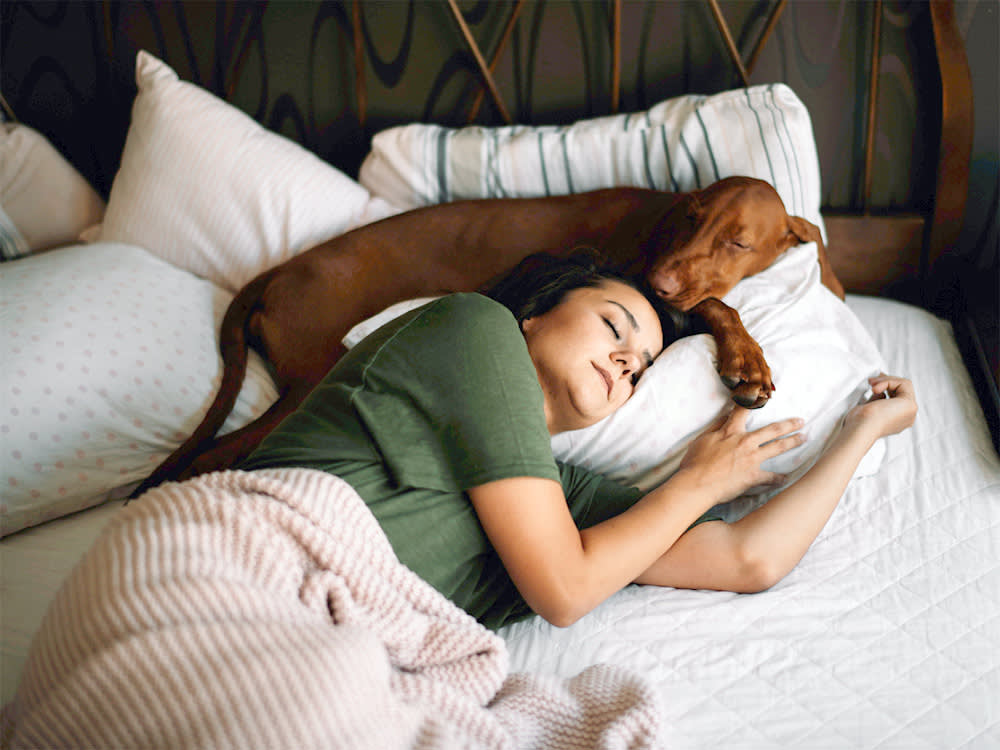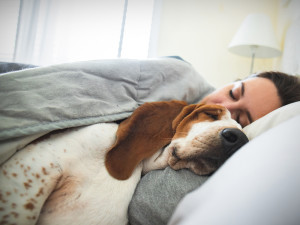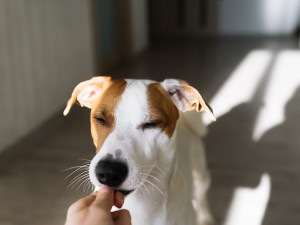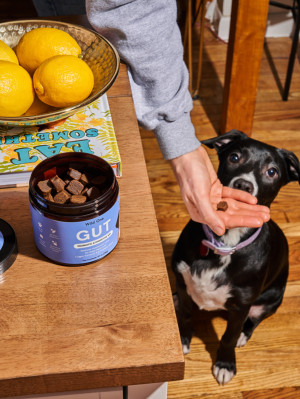Can You Give Dogs Melatonin?
Why you should talk to your vet first.
In This Article:
Can You Give Melatonin to Dogs? Appropriate Use Cases Melatonin Dosage Guidance Administering Canine Melatonin Possible Side Effects Are Human Melatonin Supplements Safe for Dogs?
Dog parents should consult their vet before giving melatonin to their dogs, as the effects and appropriate dosing vary greatly depending on your dog's size, age, and health. Melatonin may help some dogs with sleep, anxiety, or certain health issues without scary side effects.
Can you give melatonin to dogs?
Many pet parents take melatonin to help them get some rest at night and want to know if it can improve their dogs sleep as well. Research on melatonin in dogs is still in the early stages, but there are some conditions that it may be useful for. Because the study of how melatonin can be used to help dogs is so new, there is a lot of conflicting information and uncertainty about what problems it can help treat, how much melatonin is right for dogs, and the potential drawbacks.
How much do you spend on your pet per year?
Cases for appropriate use
Melatonin has most commonly been looked at to see if it can help in sleep disorders, stress relief, anesthetic procedures, and seizures. So far, melatonin seems to show some benefit in dogs experiencing the following:
Stressful situations
Preparation for surgery
Parents of high-strung dogs often wonder if they can give dogs melatonin for anxiety. Studies show some promise for this use. Puppies taking melatonin before long road trips showed fewer systemic signs of stress when traveling in the heat. Dogs given melatonin in the days before and after being spayed or neutered also had fewer changes induced by stress hormones. Some dogs given melatonin as a preoperative medication even required less anesthetic medication to be put under for surgery, likely due to its calming effects.
Results have been mixed for other uses of melatonin like:
Hair loss
Seizures
Canine cognitive dysfunction
Sleep disorders
Immune-mediated thrombocytopenia
For these conditions, the role of melatonin in their treatment is still uncertain. Melatonin does seem to help some dogs with seasonal hair loss or thinning (usually occurring in the fall or winter), but it is not consistently successful in helping to regrow hair. Although administering melatonin to dogs with hair loss doesn’t always work, your veterinarian may recommend a trial of it if other therapies have failed.
It was theorized that dogs with epileptic seizures may have a deficiency in melatonin, but melatonin levels are not significantly lower in dogs with seizures than those without. There have not been any studies exploring the use of melatonin to treat seizures in dogs yet. It’s unlikely that melatonin will be able to control epileptic seizures on its own, but it may be useful as part of treatment for dogs that continue to have seizures while on routine medications.
Surprisingly, melatonin hasn’t shown much benefit in studies for dogs with sleep disorders. Melatonin is very commonly used by dog parents to help their dogs sleep and has worked well anecdotally, but this effect hasn’t shown up in studies. It’s possible this is due to issues with dosing, timing, or differences in the types of sleep disorders dogs may experience.
A niche use for melatonin may be in the treatment of immune-mediated diseases, especially immune-mediated thrombocytopenia (IMT). In IMT, a dog’s body begins to attack its own platelets, leading to bruising, bleeding, and anemia. Melatonin may help to stimulate the production of additional platelets, allowing dogs to recover more quickly from this deadly disease.
Melatonin dosage guidance
Included in the uncertainty about melatonin’s usefulness in dogs is how much melatonin you can give a dog by weight. The amount given in studies varies widely, even in studies looking at the same potential use for the supplement. It’s also unclear if melatonin should be dosed by body weight or if it should have a flat dose like in people. It’s likely that a dose based on body weight will develop over time because of the wide variety of dog sizes.
At this time, the best bet for starting melatonin for your dog is to discuss the problems you’re concerned about with your veterinarian, so they can develop a dose based on your dog’s health history and the condition being treated. Starting with a low dose and increasing gradually may be recommended so that you can monitor the response and make sure there are no adverse effects.
Administering canine melatonin
A walk down the aisle of any pharmacy or health store will present you with a wide range of products containing melatonin. You might see tablets, capsules, gummies, or liquid formulations, some with melatonin as the only ingredient and some combining melatonin with CBD, 5-HTP, Vitamin B6, L-theanine, or magnesium. Most formulations claim to contain between 1 mg and 5 mg of melatonin per serving, but a serving may be more than one pill in some cases.
These label claims should be taken with a grain of salt though. Melatonin is considered a supplement in the United States, so it is not regulated by the FDA and does not undergo the rigorous testing that labeled drugs do. A 2022 studyopens in new tab showed that of 25 products for humans tested, only three contained an amount of melatonin within 10% of what was stated on the label. This lack of reliability may be a reason for some inconsistent treatment results, so if you’re using melatonin and find a product that works for your dog, stick with it.
Unless recommended by your veterinarian, avoid combination products containing other supplements. Many of those ingredients have even less testing in dogs and there’s no reason to add additional medications without a reason. Some, like 5-HTP, can even be harmful to dogs in high amounts.
When is the best time to give a dog melatonin?
The usual recommendation for melatonin is to give it about 45 to 90 minutes before you need it to work. You can time this in the evening for sleep or night anxiety. For stressful events like car rides, vet appointments, and fireworks, your veterinarian may additionally recommend starting the melatonin a day or two early to help promote a calm attitude.
Possible side effects
Despite the uncertainty about how effective melatonin is for dogs, the good news is that it seems to have minimal or only mild side effects. Some parents have noted symptoms such as:
Upset stomach
Cramps
Itchiness
Elevated heart rate
Disorientation
Overall, most dogs seem to tolerate melatonin well and do not show any adverse effects from the supplement. If you’re worried your dog is not reacting well to the melatonin, discontinue giving it and contact a veterinarian as soon as possible. Melatonin can cause vivid dreams in people (especially when first taking it), but it’s unknown if this happens in dogs. You can watch out for some extra kicking or twitching while they’re sleeping to see if you think they’re affected.
Are human melatonin supplements safe for dogs?
Dog parents who have trouble getting their pup to sleep may wonder, “can you give dogs human melatonin?” Similar to human melatonin products, dog supplements are not regulated and may suffer from the same reliability problems that human versions have. Despite this, buying a canine product may be recommended by your vet because they often come in lower concentrations that are more appropriate for dogs.
Can you give dogs melatonin gummies?
While some melatonin gummies and chewable tablets may be OK for dogs, many contain xylitol, which is toxic to dogs and causes low blood sugar and liver failure. Check the label of any melatonin product before you use it (and recheck with each new bottle, because formulations can change without notice) to make sure it’s free of xylitol. In general, it’s better to stick with pills and learn how to give your dog medication with minimal fuss.
FAQs (People also ask):
Can you give a dog melatonin every day?
Your veterinarian may recommend daily melatonin for conditions like anxiety, sleeping issues, hair loss, or other problems. Melatonin can be used daily with your vet’s guidance.
What can I give my dog for anxiety at night?
If your dog is constantly anxious at night, you should have them assessed by your vet for sundowner syndrome (also known as cognitive dysfunction syndrome). They can help figure out the reasons for your dog’s anxiety and suggest therapies to help.
What should I do if my dog ate my melatonin?
The easiest solution is to talk to your vet’s office or a pet poison control center for advice and guidance. While most small ingestions of melatonin are harmless, melatonin products can contain other supplements or additives toxic to dogs.












